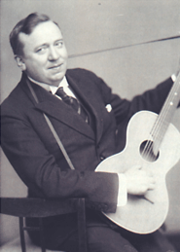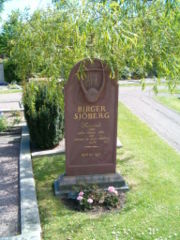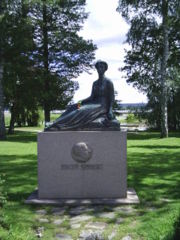
Birger Sjöberg
Encyclopedia
Birger Sjöberg was a modern Swedish poet
and songwriter.
Originally a journalist, Sjöberg wrote songs in his spare time. His first collection Frida's Book (Fridas bok, 1922) was extremely popular. After initiating a series of concert tours, he withdrew from public life and focused on poetry and prose writing.
After his death in 1929, a new series of songs (1929) and a selection of poems were published.

,_den_5_juli_2006.jpg)


Poetry
Poetry is a form of literary art in which language is used for its aesthetic and evocative qualities in addition to, or in lieu of, its apparent meaning...
and songwriter.
Originally a journalist, Sjöberg wrote songs in his spare time. His first collection Frida's Book (Fridas bok, 1922) was extremely popular. After initiating a series of concert tours, he withdrew from public life and focused on poetry and prose writing.
After his death in 1929, a new series of songs (1929) and a selection of poems were published.
Works

,_den_5_juli_2006.jpg)
- Fridas bok, 1922, poetry
- Kvartetten som sprängdes, parts 1 and 2, 1924, novel
- Kriser och kransar, 1926, poetry
- Fridas andra bok, 1929, poetry
- Minnen från jorden, 1940, poetry
- Syntaxupproret, 1955, poetry
- Fridas tredje bok, 1956, poetry
- Samlade dikter, 1973, collected poetry
- Samlade visor, 1981, collected song lyrics
His works in English
- Anthology Of Swedish Lyrics (1930) - (trans. by Charles Wharton Stork)
- Modern Swedish Poetry Part 2 (1936) - (trans. by C.D. Locock)
- Scandinavian Songs And Ballads (1950) - (trans. by Helen Asbury)
- 20th Century Scandinavian Poetry (1950) - (trans. by Helen Asbury and Martin S. Allwood)
- 12 Pieces From Frida’s Book (1975) - (trans. by Michael Roberts)
- LP: When First I Ever Saw You (1980) - (trans. by Tom Fletcher and Michael Roberts)
- Frida's New Clothes (2008) - (trans. by Stork, Locock, Asbury, Roberts . . .)
His life in English
- A History of Swedish Literature (1961) - (Alrik Gustafson)
- A History of Swedish Literature (1989) - (Ingemar Algulin)
- A History of Swedish Literature (1996) - (Lars G. Warme)


Frida Cleans House
- Something angel-like you may be certain,
- Makes a halo round my Frida's head,
- When behind the Spring's new flowered curtain
- Swift and light I hear her busy tread.
- Never crashing with a din dismaying,
- Soft she goes as rushes' whispered song.
- Yet she does not stand, as is the saying,
- On the social ladder's highest rung.
- How she makes a thing of grace and beauty
- Of a task so worldly, I'm afraid
- Science must explain, for that's a duty,
- Loving her so much, I must evade.
- With her brimming pail she kneels to scour;
- Then she dries the prisms round the light.
- Dainty as a butterfly or flower,
- Gentle as the wavelet gleaming bright.
- Winter's padding from the windows tearing,
- Breathing on the pane she rubs it clean.
- Quick and strong, her little hands unerring,
- Find again the copper's hidden sheen.
- "Charles XII's Last Journey" next is dusted
- To a lively Boston's gay refrain.
- Happy should the soldiers be, entrusted
- To those hands, where fain they would remain.
- While a song the gusty breeze composes
- In the wires strung across the roof,
- On a chest the china cat reposes,
- From the rush and flurry quite aloof.
- Now my angel must a hammer borrow
- While she nails the sampler on the wall:
- "Leave beneath the threshold care and sorrow,
- And your hat and cane out in the hall."
- Surely now my loving words have taught her
- That no bitterness my lot may bear;
- Even with the Judge's lovely daughter
- Gentle Frida safely can compare.
- If, in frock-coat hung with decoration,
- He should say "My daughter you may wed,"
- I should run where Frida has her station,
- Hunting moths in draperies outspread.
- Though a worldly wind may stir her curtain,
- Worldly dust may gather in her tread,
- Still an angel light, you may be certain,
- Shines about my Frida's lovely head.
- See her like a queen her realm surveying
- Though mid steaming buckets she be found.
- No, she does not stand, as is the saying,
- On the social ladder's highest round.
- Birger Sjöberg Frida's Book 1922
- English translation by Helen Asbury

